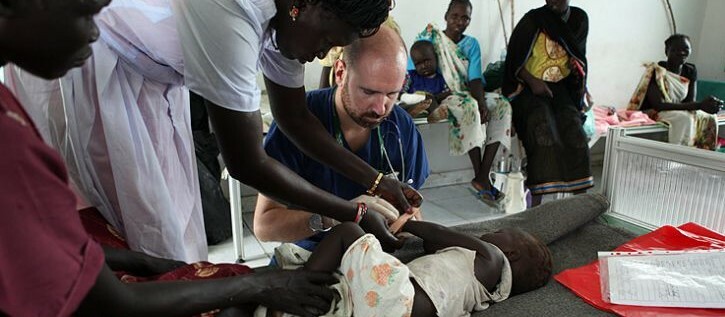Since gaining independence in 2011 from its now northern neighbour following decades of a protracted civil war, South Sudan faces daunting challenges in the provision of health services – especially in hard-to-reach areas with health infrastructures broken down during the civil war and made worse by the 2013 -2016 conflict.
Since 2010, the USAID-funded CORE Group Partners Project (CGPP) has been supporting the South Sudan government’s efforts in the provision of health services across the country. Working in partnership with national and international nongovernmental organizations, CGPP – initially CORE Group Polio Project (CGPP) – implements health projects in Central Equatoria, Eastern Equatoria and Western Equatoria as well as in Upper Nile – with each state being managed by a partner.
Hosted by World Vision South Sudan, CGPP’s main objective is to advance community health through the establishment of a robust integrated community-based surveillance (CBS) to enable timely detection and reporting of suspected cases of acute flaccid paralysis (AFP) for polio, measles, yellow fever, Ebola virus disease, COVID-19 and adverse events following immunization (AEFI). The CBS is supported by a network of community volunteers comprising 540 (125 females and 415 males) home health promoters and 5,094 (2,435 females and 2,659 males) community key informants – all working under the watchful eyes of project supervisors.
The CBS network of home health promoters and community key informants engage widely in giving health information to community members, unlike in the traditional approach whereby community members have to seek health information while visiting a health facility. Through house-to-house visits and visits to social places (such as markets, churches, farmlands and water points), community volunteers are able to detect and report health events facing members of the community and then refer them to the nearest health facilities for further management. Also, in their interaction with communities, community members are able to demystify myths and misinformation that tend to discourage or even prevent some people from going to seek for traditional medicines. A well-established CBS links the community to health facilities. This facilitates early detection, reporting, referral, investigation, and management of diseases and response to events.
Given its advantages over the traditional approach of healthcare workers waiting to receive the sick in health facilities only, the CBS has to be sustained by the government as a viable approach for community health interventions. Its sustainability certainly, requires dedicated effort and the support of community volunteers.
Such home health promoters and community key informants have to be motivated and provided with regular capacity-building, mentorship visits, and coordination of their efforts in order to maintain standards and deliver quality results. The provision of such amenities should not be seen as a heavy burden; this network usually operates in remote and often hard-to-reach areas. In so doing, they can relieve the government health personnel and development partners of the burden of frequently travelling to such areas to carry out supportive supervision and other duties. For instance, this network supports integrated CBS and was able to report 9 (6 female, 3 male) suspected cases of acute flaccid paralysis (AFP) between October and December 2022 and 6 (3 female, 3 male) cases in the first quarter of 2023 – as compared to 22 cases of AFP reported at the facility level in 2022 and 2023.
Although the above comparison shows fewer suspected cases of AFP reported through the CBS network vis-à-vis those in the facility, it is worth noting that CBS plays a big complimentary role to the facility. It is, therefore, crucially important to strengthen and sustain the CBS network for better health service delivery across South Sudan.
But, a bit of caution! A waterproof mechanism of supervision, monitoring, accountability, and reporting has to be put in place. Usually, if not closely monitored, the volunteers working in far-flung locations might be tempted to delay reporting suspected events that will pose a danger to the community. Therefore, the government, agencies, and donors need to empower CBS so as to maintain the hopes of those with limited access to healthcare.
The author, Alfred Geri, is the Communication Coordinator at the Core Group Partners Project (CGPP) Secretariat, South Sudan.
The views expressed in ‘opinion’ articles published by Radio Tamazuj are solely those of the writer. The veracity of any claims made is the responsibility of the author, not Radio Tamazuj.



